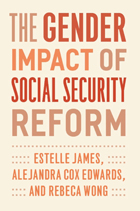
The Gender Impact of Social Security Reform compares the gendered outcomes of social security systems in Chile, Argentina, and Mexico, and presents empirical findings from Eastern and Central European transition economies as well as several OECD countries. Women’s positions have improved relative to men in countries where joint pensions have been required, widows who have worked can keep the joint pension in addition to their own benefit, the public benefit has been targeted toward low earners, and women’s retirement age has been raised to equality with that of men. The Gender Impact of Social Security Reform will force economists and policy makers to reexamine the design features that enable social security systems to achieve desirable gender outcomes.

But what is the average person to make of all this? How many Americans know where the money for Social Security benefits really comes from, or who wins and loses from the system's overall operations? Few people understand the current Social Security system in even its broadest outlines. And yet Social Security reform is ranked among the most important social issues of our time.
With Making Sense of Social Security Reform, Daniel Shaviro makes an important contribution to the public understanding of the issues involved in reforming Social Security. His book clearly and straightforwardly describes the current system and the pressures that have been brought to bear upon it, before dissecting and evaluating the various reform proposals. Accessible to anyone who has an interest in the issue, Shaviro's new work is unique in offering a balanced, nonpartisan account.

For generations, debating the expansion or contraction of the American welfare state has produced some of the nation's most heated legislative battles. Attempting social policy reform is both risky and complicated, especially when it involves dealing with powerful vested interests, sharp ideological disagreements, and a nervous public.
The Politics of Policy Change compares and contrasts recent developments in three major federal policy areas in the United States: welfare, Medicare, and Social Security. Daniel Béland and Alex Waddan argue that we should pay close attention to the role of ideas when explaining the motivations for, and obstacles to, policy change.
This insightful book concentrates on three cases of social policy reform (or attempted reform) that took place during the presidencies of Bill Clinton and George W. Bush. Béland and Waddan further employ their framework to help explain the meaning of the 2010 health insurance reform and other developments that have taken place during the Obama presidency. The result is a book that will improve our understanding of the politics of policy change in contemporary federal politics.
READERS
Browse our collection.
PUBLISHERS
See BiblioVault's publisher services.
STUDENT SERVICES
Files for college accessibility offices.
UChicago Accessibility Resources
home | accessibility | search | about | contact us
BiblioVault ® 2001 - 2025
The University of Chicago Press









